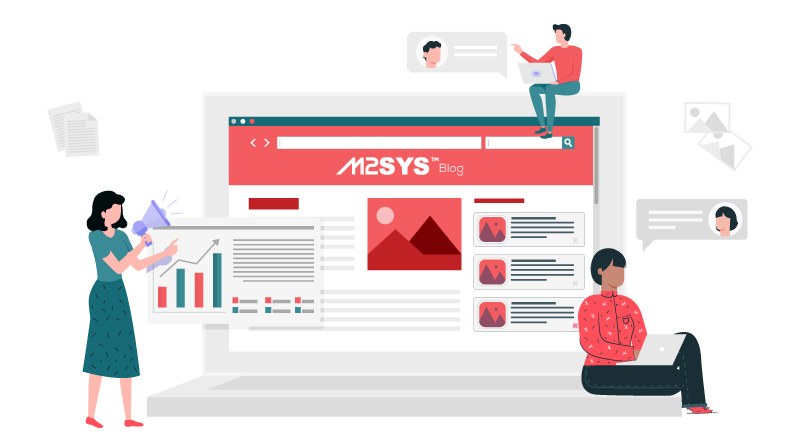Biometric Authentication and Cloud ERP
Enterprise resource planning (ERP) and service resource planning (SRP) software play a crucial role in many organizations. As cloud computing grows, several businesses are shifting to cloud-based SRP systems. While that shift has many advantages, it also introduces some identity management concerns.
Like any cloud service, cloud ERP requires fast, reliable verification of users’ identities. Usernames and passwords are the most familiar of these authentication steps, but they fall short of modern ERP needs. Using a biometric authenticator instead can help businesses make the most of these systems.
The Rise of Cloud-Based SRP
ERP solutions provide a single point to monitor and control business processes, from customer management to inventories to HR. Moving these all-in-one platforms to the cloud was a natural next step as cloud services became more reliable and business data volumes expanded.
Today, 62.7% of ERP users use a cloud-based system. Of those still using on-premise ERP, 40.9% cite a need for more knowledge about cloud offerings as their primary reason for avoiding them. Consequently, as cloud computing as a category grows and more people become familiar with these solutions, it’s safe to assume more ERP adopters will move to the cloud.
As these adoption trends highlight, cloud-based SRP is quickly becoming the standard. ERP providers must carefully consider how they handle identity management as it does, since this is often a more prevalent concern in the cloud than with on-prem solutions.
Why Cloud ERP Needs Biometric Authenticators
Biometric authenticators are the ideal solution for identity and access management (IAM) in cloud ERP systems. That’s due to three primary reasons — biometrics’ security, efficiency and potential for error reduction.
Securing Remote Access
Biometric authentication’s security is the most critical reason cloud ERP solutions should embrace it. Remote accessibility is one of the key advantages of cloud ERP over on-prem alternatives, but supporting remote access introduces security concerns. Organizations must ensure authorized users are who they say they are — passwords alone are insufficient in that regard.
Stolen credentials were the most common attack variety behind data breaches in 2022, accounting for roughly 40% of incidents. Many users have weak, easily brute-forced passwords that are easier to remember, but even secure passwords are vulnerable to credential stuffing and phishing attacks.
Biometric authenticators have the obvious advantage of being impervious to theft. Cybercriminals can’t steal a fingerprint or face, nor can they brute-force through biometric scans. As a result, they offer far more security, making them ideal for authenticating remote users.
Improving Efficiency
Another advantage of biometric authenticators for cloud-based SRP is they’re more efficient than other authentication methods. Cloud ERP systems typically replace three to five software systems — sometimes more — so efficiency is a big selling point. Conventional login methods don’t support that efficiency, stopping teams from getting all they can from these solutions.
Typing in a username and password takes time, especially if the password is as long and complex as it should be. Multi-factor authentication makes these login processes even more time-consuming, though it’s an important security step. Biometric authentication is almost immediate, helping users balance security and efficiency.
More efficient login processes mean remote users can access critical or time-sensitive ERP workflows with minimal disruption and frustration. They can then respond to significant organizational changes faster or simply maintain more responsive workflows to accomplish more in less time.
Reducing Errors
Using biometrics for identity management in cloud ERP also minimizes the risks of human error. In a conventional login system, secure credentials are prone to more mistakes, but biometric authentication doesn’t have that problem.
Longer passwords are harder to remember, especially if users use unique ones. As a result, employees may input the wrong credentials or make typos, barring them from accessing their accounts. In a best-case scenario, these errors make the login process longer and more frustrating, but in some cases, they may create false security alerts.
Today’s biometric technologies can keep false positives to one in 10,000 cases and false negatives to one in 100,000. That reliability makes it unlikely that people will get locked out of their accounts, ensuring security teams can focus on real issues and maintain their efficiency.
Cloud ERP Identity Management Best Practices
Biometrics’ security, reliability and efficiency make it the optimal IAM solution for cloud ERP software. However, if ERP providers and their customers want to make the most of it, there are some things to keep in mind.
As helpful as they are, biometric authenticators can be expensive to implement. The solution to this issue may also lie in the cloud. Cloud-based biometric solutions are more easily scalable to organizations’ needs than device-based alternatives, so they’re often more cost-effective.
Cloud-based biometrics may also improve login efficiency. Mobile devices may have limited hardware capabilities, so using a cloud solution to process requests instead ensures these constraints don’t slow the process.
Organizations should also reveal how they or their security partners store biometric data. Unlike passwords, biometrics can’t change in the event of a beach, so it’s essential to keep this data in secure environments. Implementing zero-trust security for these databases and enabling continuous monitoring through AI is a must.
Biometric Authenticators Are Essential for Cloud ERP
Cloud-based SRP systems provide many benefits over their on-premise counterparts. Their IAM solutions should offer similar advantages — biometric authentication does just that.
Biometrics is secure, reliable and efficient, all of which are characteristics a remotely accessible ERP platform needs. As cloud ERP grows and more organizations realize these benefits, biometrics will emerge as the IAM technology of choice.











